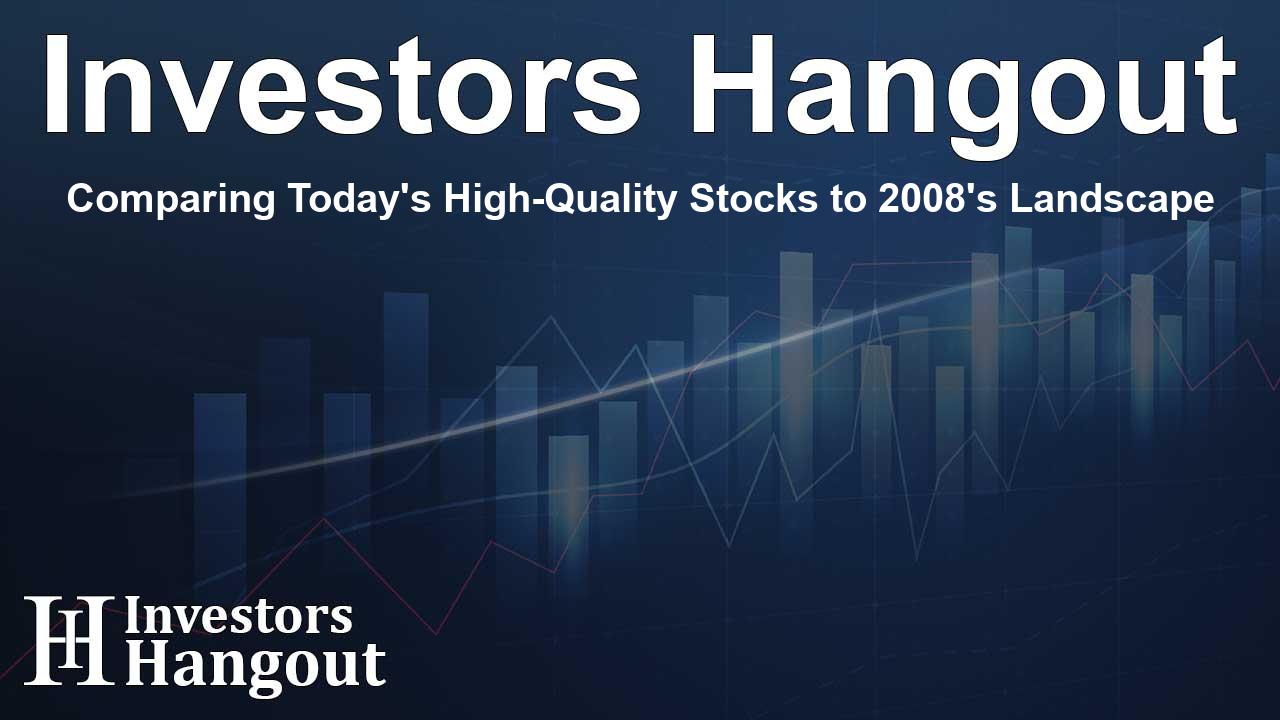Comparing Today's High-Quality Stocks to 2008's Landscape

Understanding Today's High-Quality Stock Landscape
Recent insights from Bank of America (BofA) shed light on the significant differences between today's high-quality stocks and those prevalent during the financial crisis of 2008. As market volatility increases, many investors are being drawn to high-quality stocks, yet these assets reflect a transformation from the previous decade.
The Shift in High-Quality Stock Valuation
BofA highlights that high-quality stocks, rated "B+ or better" by S&P, are currently not trading at the steep discounts that were commonplace in the wake of the Tech Bubble. Instead, these stocks have seen a re-rating to a modest premium, a development that BofA interprets as a normalization rather than a sign of overvaluation.
The BofA strategists state: "The last two decades were anomalous, driven by hyper-accommodative policy and ultra-low rates which encouraged risk-taking. Finance 101 teaches that predictability should command a premium over risk, and today's quality premium aligns with its average prior to 2000, indicating a return to norms. Today's quality is not 2008's quality," the bank remarks.
Changing Perceptions of Cyclical and Defensive Stocks
Interestingly, BofA observes that many cyclical sectors are often viewed as lower quality. This perception has led investors to prefer defensive and secular growth sectors. While cyclical sectors typically carry higher betas and are viewed as riskier, a closer look at earnings volatility offers a different perspective.
BofA suggests that, surprisingly, several larger cyclical sectors now exhibit higher quality characteristics compared to defensive or secular growth companies. For instance, the financial sector has recently reported the highest proportion of high-quality firms, indicating a shift in health and reliability.
Market Dynamics and Dividend Trends
A key consideration in today's market is the current S&P 500 dividend payout ratio, which is nearing record lows. This trend points to safer and more sustainable dividend yields compared to what was available in 2008. As a result, dividends may play a more critical role in total returns moving forward, especially as the prospects for substantial long-term price increases appear more limited.
Insights on Earnings Stability
Moreover, BofA's analysis indicates that the equal-weighted S&P 500 has exhibited more stable earnings compared to the traditional capitalization-weighted S&P 500 index. This suggests a potential shift in investor preference towards more consistent performers in these unpredictable market conditions.
Frequently Asked Questions
What is the primary focus of Bank of America's latest insights?
Bank of America's insights primarily focus on the differences between today's high-quality stocks and those during the 2008 financial crisis.
How have high-quality stocks changed since the financial crisis?
High-quality stocks are currently trading at a premium, contrasting with the deep discounts observed after the Tech Bubble.
Why are cyclical sectors perceived differently than defensive sectors?
Cyclical sectors are often viewed as riskier due to higher betas, yet they may possess higher quality characteristics than defensive sectors.
What does the S&P 500's dividend payout ratio indicate?
The near-record low dividend payout ratio suggests that dividends are safer and more sustainable than they were in 2008, potentially contributing more to total returns.
How do equal-weighted and cap-weighted indices compare?
The equal-weighted S&P 500 demonstrates more stable earnings compared to the cap-weighted index, indicating a stronger overall market performance.
About Investors Hangout
Investors Hangout is a leading online stock forum for financial discussion and learning, offering a wide range of free tools and resources. It draws in traders of all levels, who exchange market knowledge, investigate trading tactics, and keep an eye on industry developments in real time. Featuring financial articles, stock message boards, quotes, charts, company profiles, and live news updates. Through cooperative learning and a wealth of informational resources, it helps users from novices creating their first portfolios to experts honing their techniques. Join Investors Hangout today: https://investorshangout.com/
Disclaimer: The content of this article is solely for general informational purposes only; it does not represent legal, financial, or investment advice. Investors Hangout does not offer financial advice; the author is not a licensed financial advisor. Consult a qualified advisor before making any financial or investment decisions based on this article. The author's interpretation of publicly available data shapes the opinions presented here; as a result, they should not be taken as advice to purchase, sell, or hold any securities mentioned or any other investments. The author does not guarantee the accuracy, completeness, or timeliness of any material, providing it "as is." Information and market conditions may change; past performance is not indicative of future outcomes. If any of the material offered here is inaccurate, please contact us for corrections.